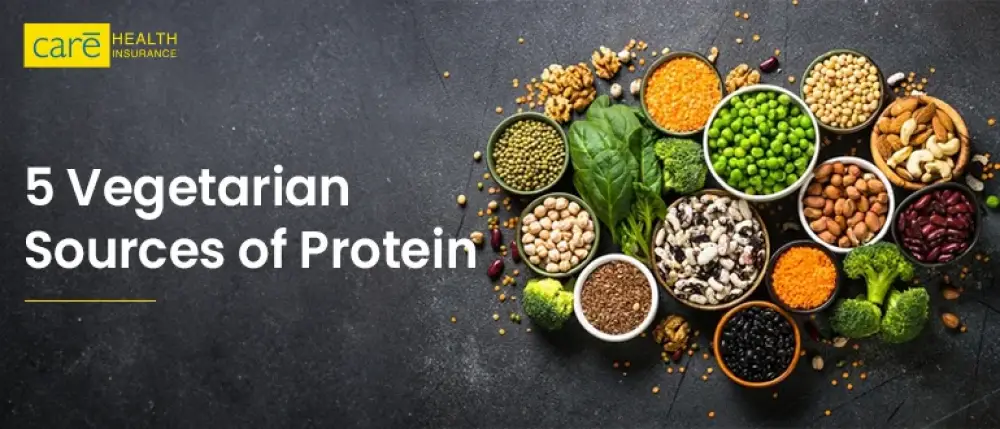Subscribe to get weekly insights
Always stay up to date with our newest articles sent direct to your inbox
Published on 25 Nov, 2024
Updated on 2 Nov, 2025
4270 Views
3 min Read

Written by Anjali Sharma
favorite7Likes
Being a vegetarian means avoiding the risk of multiple diseases. A vegetarian diet consists of all kinds of nutrients. Multiple options are available for healthy vegetarian sources of protein. Simply put, protein-rich vegetarian foods help reduce the consumption of saturated fats and cholesterol, which could increase cardiovascular risks.
Usually, meat is the most common and famous source of protein considered by most people. As a vegetarian, you might face a dilemma of meeting your daily protein requirements.
Let us explore more about the vegetarian protein sources in this article to help you build a balanced diet.
Protein is an essential nutrient made up of chains of amino acids. It is one of the most important nutrients required for the proper functioning of the body. Protein repairs and contributes to the growth of new cells and plays a vital role in the growth and development of children, teens and pregnant women.
The protein requirements might vary for every person. It is usually advised to intake about 0.75g of protein per kilo of body weight per day (for the average woman, this is 45g, or 55g for men) in the case of adults.
Plant-based protein foods contain a high amount of fibre, vitamins, minerals, and antioxidants that contribute to your overall well-being. They also reduce the risk of many chronic diseases, such as heart disease, diabetes, and cancer.
Let us learn more about the best high-protein vegetarian foods and tips on adding them to your diet today.
Including plant based protein foods rather than animal-based protein food in your diet would be beneficial for both your health and the environment.
Mentioned below are a few benefits of plant-based protein foods:
Protein deficiency can have multiple signs and symptoms, as protein is essential for the proper growth of the body.
Protein deficiency might expose you towards multiple health complications. To ensure you get the right treatment on time within your budget. We at Care Health Insurance provide you with the most affordable health insurance so that you can be stress-free regarding the complete treatment process.
Vegetarian sources of protein are diverse and nutrient-rich, providing various options to meet your protein requirements without consuming meat. Food items such as legumes, nuts, seeds, whole grains, and dairy products provide ample amounts of protein. Incorporating such vegetarian sources in your diet ensures adequate protein intake, provides great muscle health, and supports your natural well-being.
>> Also Read: How Does Protein Deficiency Affect Children?
Disclaimer: Plan features, benefits, coverage, and underwriting of claims are subject to policy terms and conditions. Please refer to the brochure, sales prospectus, and policy documents carefully.
Thyroid : मामूली नहीं हैं महिलाओं में थायराइड होना, जानें इसके लक्षण और घरेलू उपचार Vipul Tiwary in Diseases
शुगर कंट्रोल कैसे करे? जानें, डायबिटीज में क्या खाना चाहिए Vipul Tiwary in Health & Wellness
हाई ब्लड प्रेशर को तुरंत कंट्रोल कैसे करें? देखें इसके उपाय Vipul Tiwary in Diseases
पैरों में दर्द किस कमी से होता है? जानें, इसके घरेलू इलाज Vipul Tiwary in Health Insurance Articles
Iodine Rich Foods: The Unsung Heroes of a Healthy Thyroid and a Sharp Mind Jagriti Chakraborty in Diet & Nutrition
What Happens to Your Body When You Eat Capsicum Every Day? Jagriti Chakraborty in Diet & Nutrition
Smart Guide to Reading Nutrition Labels for Healthy Choices! Sejal Singhania in Health & Wellness
Say Goodbye to Low Estrogen Symptoms: Causes, Symptoms & Easy Lifestyle Fixes Jagriti Chakraborty in Diet & Nutrition
A plant-based diet can easily provide all the essential amino acids that are required by the human body to function well. Foods like quinoa, soybeans, and chia seeds are great examples of complete plant protein sources that contain all the essential amino acids properly.
According to doctors, to prevent protein deficiency, one should consume about 0.8 grams of protein per kilogram of body weight. For example, if one weighs around 75 kg, then they should take up to 60 grams of protein per day.
When consuming a vegetarian diet, there is a chance that you might develop a deficiency of vitamin B12. But by making some alterations in the diet you can fulfil that. You can increase the amount of dairy products in your diet to balance the diet with all kinds of nutrients.
If your diet lacks protein, then there are chances that you might feel tired very often. You can possibly lose some muscle mass making it hard for you to keep your body balance.
The vegetarian food items for kids that are rich in protein are cottage cheese, tofu, lentils, nuts, seeds and beans. As this is their growing age, having the right proportions of protein in their diet becomes necessary.
Always stay up to date with our newest articles sent direct to your inbox
Loading...